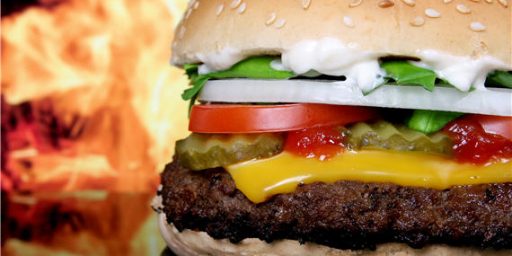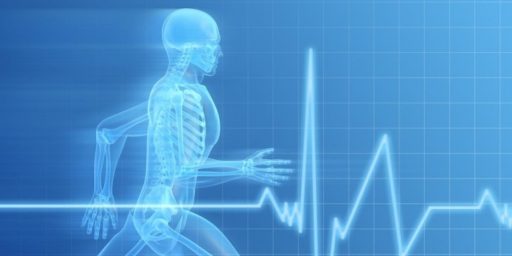Eat Less, Live Longer
An article in New Scientist shines light on research finding that radically reducing intake of food, especially protein, can lead to a longer, healthier life.
Calorie restriction dramatically extends not only the lifespan of laboratory animals, but also their “healthspan” – how long they live free of disease. On the assumption that it has the same effect in people, some individuals have already adopted a restricted diet. The latest evidence suggests that while calorie restriction is indeed beneficial for humans, when it comes to lifespan extension, it may not be the whole story.
[…]
Calorie restriction has since been shown to extend the lives of other organisms including yeast, nematode worms, fruit flies and mice. Mice, for example, live up to 50 per cent longer if their calorie intake is cut by 30 to 50 per cent. What’s more, mammals are protected from a number of age-associated maladies such as cancer, heart disease, type 2 diabetes and Alzheimer’s disease.
It is unclear why eating less should make animals live longer. While a restricted diet triggers numerous changes at the molecular and genetic levels, only some of these are common across all the species tested. However, there does seem to be a general principle that a dearth of nutrients causes organisms to divert resources away from growth and reproduction and towards basic survival functions. From an evolutionary perspective, these adaptations could help an organism survive famine.
[…]
Needless to say, this lifestyle is not for everyone. Some people report struggling with hunger pangs, and the society warns on its website that side effects can include feeling cold, poor wound-healing and temporary infertility.
[…]
But Fontana has found a notable difference in the way people and animals respond to calorie restriction, and it is not great news. It involves a hormone made by the liver called insulin-like growth factor 1.
IGF-1 has emerged as an important promoter of ageing. IGF-1 levels are lower than normal in worms, flies and mice on a restricted diet, and this is thought to be at least partly responsible for their longer lifespan. When it comes to people, however, CRONies have the same IGF-1 levels as the rest of us.
[…]
If the new theory is right, then the whole concept of calorie restriction needs to be rethought. The very term would be misleading; Fontana and others have started referring to dietary restriction instead. As news of the study has spread, some CRONies have already reduced their protein intake.
The protein theory is bad news for people on low-carbohydrate weight-loss plans like the Atkins diet. “I’d be wary of diets that put a heavy emphasis on protein,” says Piper. “It’s hard to see how that could be healthy.” Fontana goes one step further, saying that high-protein diets could risk accelerated ageing and cancer.
It’s good news, however, for people already on low-protein diets, like vegans, who avoid eating meat, eggs and dairy products.
My initial thoughts on this is that, if this is what it takes to live a longer life, I don’t want it. That is, while health and longevity have utility in and of themselves, so does pleasure. Who wants to live a long life of deprivation and hunger?
Further, healthy people can get hit by a bus. So even living a miserable existence doesn’t guarantee that you’ll live a long time even if you decide the trade-off is worth it.
Thankfully, scientists have realized that most people aren’t going to live this extreme lifestyle.
For those who don’t fancy changing their diet, a more tempting prospect is a pill that replicates the effects without the hard work. Drug firms have taken a keen interest in trying to find such calorie-restriction mimetics, as they are sometimes called.
A decade ago the main focus was on signalling molecules called sirtuins that reduce the expression of several ageing-related genes. Reports that resveratrol, a compound found in red wine, extended lifespan in some species by activating sirtuins boosted sales of red wine and resveratrol supplements. Resveratrol still has supporters, but inconsistent animal data have since dampened much of the enthusiasm.
The focus has lately switched to finding compounds that block TOR. One such agent is a drug called rapamycin, an immunosuppressant given to recipients of organ transplants. Last year rapamycin was found to extend the lifespan of mice, even in those started on the drug in later life, equivalent to 60-year-old humans (Nature, vol 460, p 392). However, because people don’t live in a sanitised lab environment, rapamycin’s strong immunosuppressive effects make it an unlikely candidate for a practical anti-ageing drug. Similar compounds that are less toxic would be more promising.
Another candidate is a drug called metformin, already used to treat type 2 diabetes. Metformin also blocks TOR, and lengthens lifespan in worms and mice (Cell Metabolism, vol 11, p 390). Does metformin slow ageing in people too? Studies published earlier this year suggest that diabetics taking metformin do get less cancer (Diabetes Care, vol 33, p 322). “The major risk factor for cancer, above all others, is ageing,” says David Gems at University College London. He calls the studies a “smoking gun of a more generalised effect of metformin on ageing, rather than just strictly diabetes”.
While metformin is less toxic than rapamycin, it, too, can have side effects, such as nausea and diarrhoea. So researchers may have a way to go before they find the perfect longevity pill.
Now that’s more like it! Americans love pharmaceutical solutions.
via KurzweilAI







I guess some might be willing to err on the side of long life … but I think I’d like to know exactly how many extra (quality) years we are talking about before I made the decision (if it’s not already too late).
I remember a paper wrapping up high/low fat diets which concluded that foregoing fats gave an extra 30 days to the general population. My thought at the time was that fats were worth 30 days.
(I was recently learned that my blood lipids were out of bounds, and did cut them down to normal in 3 months of pills and changed diet. So I guess when my doctor insists, I’m willing …)
Look at it this way. When the much predicted fall of society comes and we’re all trying to scratch an existence out of the dirt, again. That miserable existence will last for a long, long time.
Old speak New Speak
Hunger Dieting under protest
Halfway through the article I started thinking “Man! If only there were a pill…”
And then lo and behold, pharma comes through.
It brings a tear to my eye.
That’s it exactly. I visit my 88 yoa mother-in-law at the nursing home and wonder, “Oh, God, will that be me?” Of course, chowing down on the cheeseburger in your illustration a few times a week doesn’t lead to a decent quality of life either. The Buddha and the ancient Greeks nailed it: moderation in all things.
Quite. I have a burger maybe three times a month. Steaks, alas, more often.
Wow this is wrong. I don’t even know where to begin. My favorite quote from the article is:
Yes, terribly difficult…unless you do some research on actual people. If eating a diet high in protein is harmful how do you explain the fact that Eskimos tend to have the lowest levels of chronic disease in the world (coupled with traditional Japanese who’s diet is largely fish-based). See here: http://www.mercola.com/article/carbohydrates/paleolithic_diet.htm
The obesity epidemic didn’t start because we suddenly discovered meat thirty years ago. It started because we subsidized corn and wheat by the boatload and put it into everything. Serious, what is the last thing you ate? Look at the wrapper and see if it doesn’t contain one of these two ingredients or derivatives of these ingredients.
Poor people, who by definition shouldn’t be able to afford mass quantities of expensive protein, are fatter than ever and make up a substantial portion of the obese population in the world – it ain’t because they are eating 3 steaks a day. Vegetable oil is cheap, corn is cheap, bread is cheap. This is an explosive and relatively new combination that directly corrilates to the rise in diseases unheard of before 1900 – type II diabetes and heart disease. http://www.scientificblogging.com/news_releases/study_low_income_equals_high_obesity
Check out the level of corn syrup production and it’s correlation to diabetes.
corn syrup: http://upload.wikimedia.org/wikipedia/en/e/e6/Usda_sweeteners.png
diabetes trend: http://aspe.hhs.gov/health/blueprint/scope.shtml
Also, in researching the IGF-1 gene in question it appears to have a similar molecular structure to that of insulin:http://en.wikipedia.org/wiki/Insulin-like_growth_factor_1#Mechanism_of_action
So, if we can agree that insulin regulation is at least in some way important for controlling chronic diseases ( is it probably the most important control) then shouldn’t we focus on limiting those foods associated with insulin spikes and dropoffs? Namely refined carbs, sugars, and yes corn products and byproducts. Notice I said nothing about meat or protien…the Cordain article makes that abundantly clear.
Owsley Stanley has eaten an all-meat diet for 50 years and is the picture of health. Eskimos have long had basic all-meat diets and they too do not suffer for it. This is a crock:
“The protein theory is bad news for people on low-carbohydrate weight-loss plans like the Atkins diet. “I’d be wary of diets that put a heavy emphasis on protein,†says Piper. “It’s hard to see how that could be healthy.†Fontana goes one step further, saying that high-protein diets could risk accelerated aging and cancer.”
This is stated by someone who stands to gain recognition and finances from acceptance of his dubious “theory.” There are many such researchers and scientists with competing “theories.” What they all have in common is that they make money (fad diets, cookbooks, research grants, etc, et al) when people listen to what they say; therefore, the goal is to say something different than what has been said by others before. Here are some links to the polar opposite viewpoints of those who would tell you that Fontana is trying to kill you:
http://www.thepaleodiet.com/
http://www.independent.co.uk/life-style/health-and-families/health-news/the-stone-age-diet-why-i-eat-like-a-caveman-461514.html
http://www.evfit.com/
The best advice I ever got was this:
1.) Exercise regularly and be active (both aerobic and for strength)
2.) Whenever possible: eat fresh, organic foods as opposed to preserved and processed foods or those raised or grown with hormones and chemicals
3.) If you gain weight, eat less – If you lose weight, eat more
4.) Be proactive and take positive steps to reduce the many stresses that occur in your daily life
5.) Smile, laugh, be happy and enjoy the life that you have–regardless of how long or short it is
Follow these five simple steps; it really is that easy.
To hell with living a long life. Me, I want to keel over from a massive, sudden heart attack, the kind that blindsides you. I want to do it after my fifth shot of something potent, my last bite of extra-salty steak, and the accumulated plaque of fifty thousand triple cheeseburgers lining my every vein, artery and capillary.
One factor that isn’t accounted for is the composition of the protein, or rather, the type and what goes along with it.
Saturated fat has long been linked with all sorts of diseases, but what about people who don’t eat saturated fat yet eat lots of protein? Have any studies been done that control for these variables?
What about people who maintain active, healthy lifestyles who expend more calories? Shouldn’t there be a control group in these experiments to show how activity may mitigate or accelerate this process?
Before we jump to the conclusion that yeast in a test tube or mice in a small cage are representative of human beings, we had better account for these factors first.
I watched my grandmother become totally disabled from multiple strokes and die over the course of four years, at age 63. She had adult-onset diabetes and did not do what was necessary to control it…through her, I’ve seen the kind of misery a totally unrestricted diet brings.
It’s not a fate I would wish on anyone.
I’ve been a vegan since 2000…unfortunately not the silver bullet for my chronic obesity, as I first lost, then gained 75 pounds.
I have asthma and it is much better when I’m not so overweight, so I’m actually well-motivated to try for a normal weight…something I haven’t been since I was eight years old.
To do that I will likely have to calorie-restrict for the rest of my life, possibly more than most CRONies would.